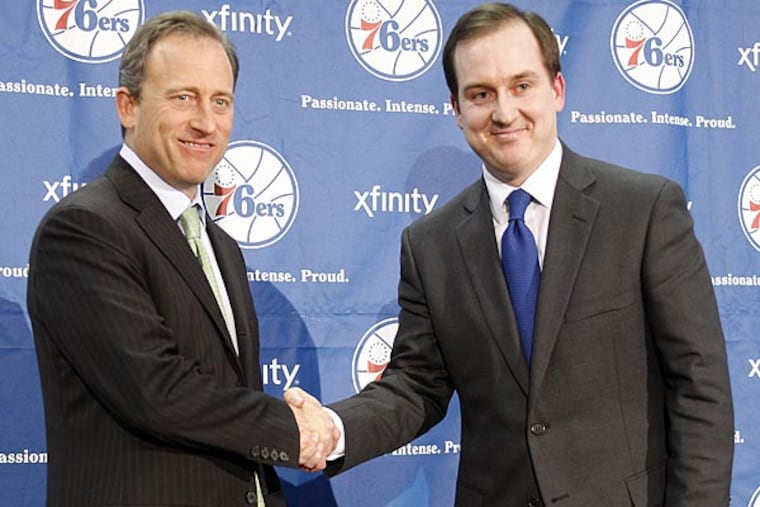Sixers must guard against outsmarting themselves
Philadelphia's sports franchises have been late to the party, but the balancing point on applying modern methods to ancient crafts was reached Tuesday when the 76ers introduced a new general manager who doesn't think "quantitative analyst" is merely a synonym for "geek who never played."

Philadelphia's sports franchises have been late to the party, but the balancing point on applying modern methods to ancient crafts was reached Tuesday when the 76ers introduced a new general manager who doesn't think "quantitative analyst" is merely a synonym for "geek who never played."
If you're keeping score, this makes it 2-2 in our town. The Sixers, with new GM Sam Hinkie, and the Eagles, with coach Chip Kelly, are trying different things. The Phillies and the Flyers are apparently still throwing them back just like the good old days and if they can't win the game, well, they'll win the fight.
There is no guarantee that either the Sixers or Eagles will be the first among the four professional franchises to achieve the very old-fashioned goal of winning a championship - or, given the currently low bar of local expectation, even competing for one - but doing the same thing for a very long time wasn't working out for them, either.
"We're not talking about going into a backroom with a bunch of computers," owner Joshua Harris said Tuesday. "We're talking about adding to a traditional front office."
Relying entirely on analytics to make personnel decisions, or relying entirely on gut instinct, would be like building a birdhouse with only a hammer. Statistical research is only a tool, but it was an underused one until the last decade in the NBA. At the moment, more than two-thirds of teams in the league employ either an analyst or a consultant to help assess and build their rosters.
It might surprise you to know that the Sixers were already among that group. They hired Aaron Barzilai as their director of basketball analytics before the start of last season. Barzilai graduated from MIT and has a doctorate from Stanford. (He also played varsity hoops at MIT, which might not sound like much, but, then again, you've never tried to solve the defense of the Babson Beavers.)
Barzilai is considered an expert on relative player values and the science of draft position, but whatever contributions he made during the season were somewhat lost on Doug Collins, at least judging by the way Collins portrayed his interest.
"My analytics are here and here," Collins said once, pointing first to his head and then his stomach.
With Hinkie in place, and a new coach open to new ideas on the way, the Sixers are probably going to go more with the here that resides above the neck. If that gets a little wonky at times, at least the decisions will be made for a reason.
"We want to improve our objective analysis and strategic thinking," Hinkie said. "My method is to be diligent."
When the Rockets added Carlos Delfino before this past season - for a very affordable $3 million with a team option for a second season at that price - Hinkie and Houston general manager Daryl Morey liked the player, but loved the fact that he was among the league leaders in rebounds per chances. Not many people have access to or pay attention to that kind of statistic, but these guys eat it for breakfast.
I can't tell you, for instance, how many dribbles per shot are taken by Evan Turner or what his points per touch ratio might be. I can tell you, however, that he isn't quick enough or a good enough ball handler to get to the rim consistently and doesn't shoot well enough to be an effective perimeter player. Turner isn't just a player without a position. He's a player without a sport.
A year from now, the Sixers will either have to negotiate a contract extension with Turner or give him a qualifying offer of $8.7 million to make him a restricted free agent. My guess is that the new front office won't find either of those options a good value for what the team gets in return. Part of the decision will come from the on-court analytics, part from the economics of continuing to pay someone whose draft position overpaid him to begin with, and part from the eyeball test. All of the tools will work together to build the birdhouse and kick Turner out of the nest.
There are certainly aspects to the game that are impossible to quantify. You didn't need a slide rule to know that Michael Jordan was a great basketball player, but figuring out how much weight to ascribe to his twin components of talent and desire was a worthy puzzle.
There is no analysis, statistical or otherwise, that provides an accurate X-ray of a player's heart . . . or ability to stay healthy . . . or willingness to adapt his game . . . or any of the hundred variables that combine to determine if he will be an overall positive addition to the roster.
Sometimes, you make the best guess you can and wait to find out if you got lucky.
What the Sixers believe, however, is that the smartest guys are usually the luckiest.